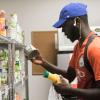New Program Prescribes an Apple a Day to Keep the Doctor Away
The Locavore

Photo Credit: Joshua L. Jones
Family nurse practitioner Holly Marbut fills out an FVRx prescription sheet at the Athens Nurses Clinic.
Our modern health-care system has often treated nutrition like a second-string player, and it’s up to us to “eat right.” Recently, however, doctors have begun looking to local farms and food banks to help provide those healthy fruits and vegetables we’re supposed to be eating, even writing prescriptions for them. These types of programs are soon to debut in Athens.
The Athens Farmers Market, Athens Nurses Clinic and UGA Snap-Ed are collaborating to launch a Fruit and Vegetable Prescription program, FVRx for short. The program, which is sponsored by Wholesome Wave, seeks to help low-income members of the community access the nutritious produce typically recommended to decrease risk of disease.
Athens Nurses Clinic director Paige Cummings says many of the 1,800 patients the free clinic serves each year are dealing with a chronic disease that could be improved by eating healthier foods.
“Obesity is becoming one of the major medical disorders,” she said. Cummings also names the usual suspects—diabetes and high blood pressure—as the more common ailments they see. All are related to eating too many sugars, carbohydrates and fats and too few fruits and vegetables.
Around 40–50 Athenians will participate in the pilot run of FVRx. Clinic staff will document key biometrics—height, weight, abdominal circumference, blood pressure, blood sugar levels—and provide medical counseling if needed. UGA Snap-Ed will give monthly nutrition classes and cooking lessons to help participants feel comfortable working with a variety of fruits and veggies. Then, it’s time to go to the market.
Each participant is given $1 per day per family member, so a family of four would receive $120 in tokens redeemable for fruits and vegetables at the Athens Farmers Market. Cummings says cost has always been a barrier to eating healthier foods, but she was surprised to learn that many of her patients didn’t even realize Athens had a farmers market.
Market Manager Sarah Thurman says she and local farmers are excited to share the vegetable love with more people in the community.
“We all know the transformative power a vegetable-rich diet has on our lives, and we’re constantly looking for ways to share that,” she says.
Expanding the market to new shoppers helps the farmers and the local economy, too. Jennifer Jo Thompson is a medical anthropologist at UGA and has led much of the research efforts behind setting up FVRx for success. To her, the program is a win-win.
“I like the way it closes the loop in terms of supporting our local agricultural community,” she says. “So not only are we supporting people in their house, but we’re also supporting the farmers who grow the food that we eat.”
Meanwhile, the Food Bank of Northeast Georgia is looking into starting a similar fruit and vegetable prescription program based on a model championed by Boston pediatricians. Child Nutrition Manager Beegee Elder was introduced to the program when she attended a national Feeding America conference last year.
“Doctors will write prescriptions for certain foods that have a vitamin or something they’re deficient in that can be filled at the local hospitals or food banks,” says Elder. “I think it’s awesome.”
Elder says food bank President John Becker is supportive of adding a food prescription service, but for now, the nonprofit has several current projects it needs to finish before taking on a new one. The first step, she says, is to continue educating kids and families about nutrition and how to use the variety of produce the food bank distributes.
“And then what I’d like to do after that is talk to pediatricians in the area see if they are interested in a program like Boston’s,” says Elder. “Eventually, I’d like to see us go in that direction.”
Athens’ FVRx program will kick off in June and run through November. Cummings hopes the pilot program will gain momentum as word spreads throughout the participants’ communities.
“If you get one person healthier,” she says, “then you get their family healthier, then you get the neighborhood healthier. If your neighborhood is healthier, your whole community improves.”












comments